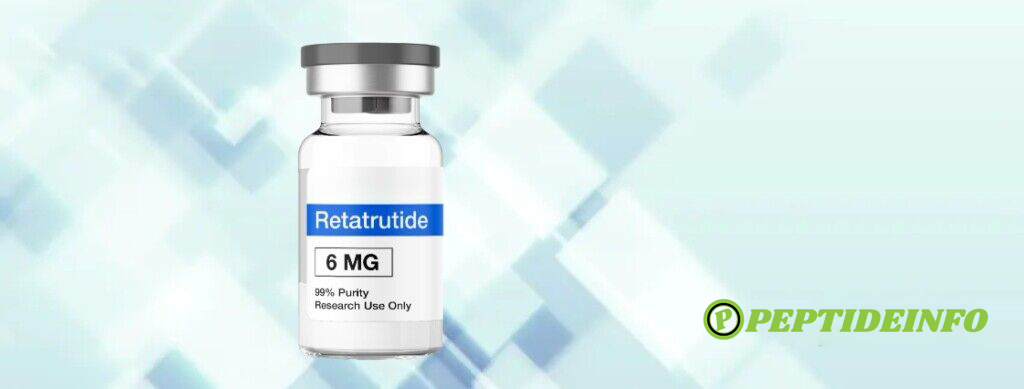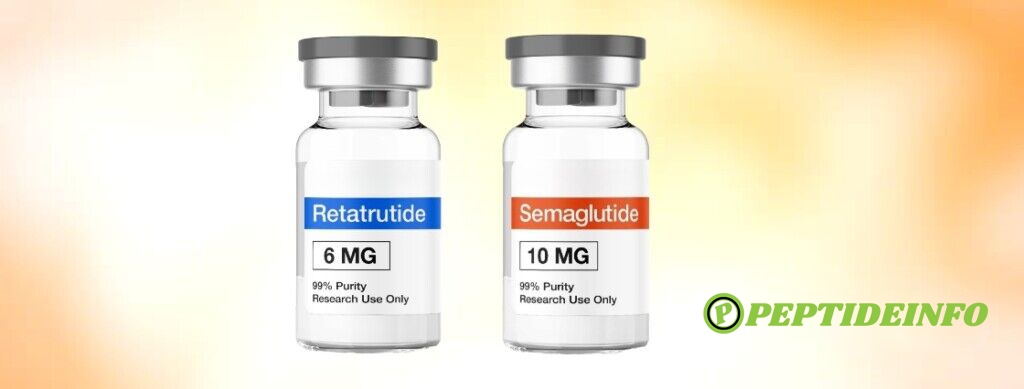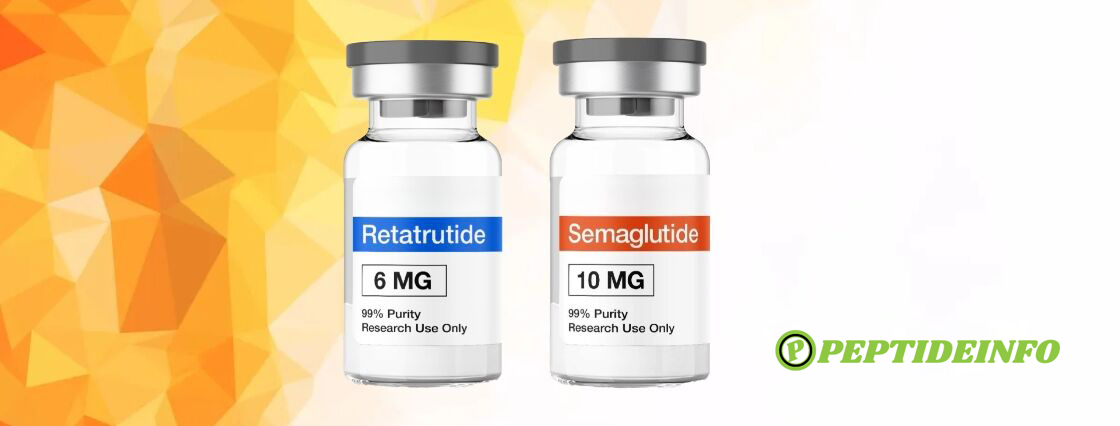What is Retatrutide?
Retatrutide (LY3437943) is a synthetic peptide developed by Eli Lilly and Company [1]. It is a novel triple agonist of two incretin hormones produced by the gut and the pancreatic hormone glucagon (GCG) [2, 3].
More specifically, retatrutide acts on the following hormones:
- Glucagon-like peptide-1 (GLP-1): an incretin hormone produced by the gut after a meal. It stimulates insulin production, suppresses appetite, and slows down stomach motility [4, 5, 6, 7].
- Glucose-dependent insulinotropic polypeptide (GIP): another incretin hormone produced by the gut after a meal. It also stimulates insulin secretion and reduces hunger [8, 9].
- Glucagon (GCG): a hormone synthesized by the pancreas that helps prevent hypoglycemia. It is also involved in the breakdown of fats within liver cells and supports the transformation of white fat into beige fat. This process increases the overall energy expenditure needed for metabolic processes such as heat generation [10].
Retatrutide comprises 39 amino acids and is based on the structure of the incretin hormone GIP. It is thus biased towards the GIP receptor, and is also modified to trigger the GLP-1 and GCG receptors [11].
By triggering the receptors of these three hormones, retatrutide has been shown to lower blood sugar, suppress appetite, and increase the calories that the body burns. This is why it is actively researched as a potential treatment for obesity and T2D [12].
Retatrutide features a fatty acid modification that enhances its stability and extends its half-life in the body to seven days. This modification enables infrequent, once-weekly dosing.
While not yet approved by the United States Food and Drug Administration (FDA), retatrutide is currently in phase 3 clinical trials as part of Eli Lilly’s TRIUMPH development program to explore its weight loss potential in individuals with and without T2D [12].

What is Semaglutide?
Semaglutide is a synthetic GLP-1 receptor agonist that was developed by Novo Nordisk in 2012 [14].
Sharing 94% of the amino acid structure of native GLP-1, semaglutide effectively binds to the same receptors. It promotes insulin release from the pancreas, influences brain receptors to decrease appetite, and slows gastric motility [7, 15].
The peptide is chemically modified via the addition of an 18-carbon fatty acid chain, which shields it from rapid degradation and enhances its binding to serum proteins. These changes extend its half-life to eight days, enabling once-weekly dosing [16, 17].
Following extensive phase 3 trials that confirmed these advantages, the FDA approved semaglutide for the following therapeutic uses, which are marketed under three brand names:
As Ozempic, semaglutide was initially approved in 2017 for treating T2D and later approved in 2020 to help reduce major adverse cardiovascular events in T2D patients. A more concentrated 2mg/weekly dose received approval in 2022 [18, 19].
As Wegovy, it gained approval in 2021 for chronic weight management at a 2.4mg/weekly dosage and that approval was expanded in 2023 to include adolescents aged 12-17 [19, 20].
As Rybelsus, semaglutide stands out as the only orally bioavailable GLP-1 receptor agonist approved in an oral formulation by the FDA for use in T2D [21].

Retatrutide vs. Semaglutide | Comparing Benefits and Research Applications
Retatrutide and semaglutide may both be applied for chronic weight management and fat reduction. These two peptides interact with incretin receptors in the brain, particularly in regions that are key to appetite control.
But unlike semaglutide, retatrutide may also boost energy expenditure, which could give it an advantage over semaglutide in facilitating weight loss. Notably, however, retatrutide has not yet been approved for any indication by the FDA or any comparable regulatory body.
Here is our comprehensive examination of the unique characteristics of these two peptides.
Retatrutide vs. Semaglutide for Weight Loss Research?
Semaglutide is FDA-approved for chronic weight management in adolescents and adults. Its regulatory approvals are based on the success of the phase 3 clinical program STEP, which demonstrated its effectiveness in reducing appetite and weight in overweight and obese study volunteers.
The potential of retatrutide is still the subject of clinical research as of 2024, and direct comparative studies between retatrutide and semaglutide have yet to be conducted.
Nevertheless, clinical data on both peptides demonstrates their effectiveness for weight loss:
- The first and largest phase 3 trial within the semaglutide STEP program was STEP-1, published in 2021. It included over 1900 overweight or obese individuals receiving 2.4mg/weekly semaglutide or placebo. Within 68 weeks, semaglutide led to a -15.0% (-32.2lb) weight reduction from baseline in the semagalutide group. Additionally, DXA scans conducted on a fraction of the treatment group showed -18.41lb fat mass loss and a -3.0% body fat reduction [22, 23].
- In a 48-week phase 2 trial published in 2023, 338 overweight and obese study participants received up to 12mg/weekly retatrutide or placebo for 48 weeks. Retatrutide led to dose-dependent decreases in weight, with an average weight reduction of -24.2% reduction in the treatment group, compared to -2.1% with placebo. The researchers also noted improvements in several health metrics following retatrutide administration, including in waist circumference, blood pressure, glycated hemoglobin, and non-HDL cholesterol [24].
These findings underscore the substantial weight loss potential of both semaglutide and retatrutide. However, retatrutide’s unique triple receptor agonism may give it greater weight loss potential compared to semaglutide.
Retatrutide vs. Semaglutide for Type 2 Diabetes Research?
Retatrutide and semaglutide have both been studied for their effectiveness in the long-term management of blood sugar in type 2 diabetes (T2D).
Semaglutide has received approval for use at doses of up to 2mg/weekly for T2D. The SUSTAIN phase 3 clinical program showed semaglutide’s ability to significantly reduce glycated hemoglobin (HbA1c)—a marker of long-term blood sugar control [18, 19].
Conversely, retatrutide, a newer peptide, is still being tested in phase 3 trials to determine its efficacy in T2D.
As of writing, no direct comparative studies have been conducted between the two peptides. Therefore, our comparison must rely on data from semaglutide’s completed phase 3 trials and retatrutide’s ongoing phase 2 trials:
- The greatest HbA1c reduction with semaglutide was showcased by the SUSTAIN-FORTE trial published in 2021, which reported a -1.9 percentage point drop from baseline HbA1c with 1mg/weekly semaglutide, and -2.2 percentage point drop with 2mg/weekly, both after 40 weeks of therapy [25].
- A 36-week phase 2 study, published in 2023 and involving 281 T2D patients treated with up to 12mg/weekly retatrutide, demonstrated significant reductions in baseline HbA1c. The patients had a reduction of -2.16% at 36 weeks, compared to no change in the placebo group. The peptide also led to a -17% reduction in body weight from baseline in the treatment group, as opposed to -3% with placebo [13].
Current evidence suggests that both retatrutide and semaglutide effectively reduce HbA1c and are generally well-tolerated, though further research is needed to fully ascertain their comparative effectiveness.
For now, it appears that retatrutide may be less favorable than semaglutide in T2D, because it replicates the actions of the GCG peptide, which opposes insulin action and increases blood glucose levels.
Retatrutide vs. Semaglutide for Cardiovascular Risk
Semaglutide and retatrutide have both been studied or are currently under research for other potential uses apart from obesity and T2D management.
Notably, semaglutide has been approved for reducing the risk of major adverse cardiovascular events (MACE) in T2D based on studies of the SUSTAIN program.
More specifically, the SUSTAIN-6 trial studied semaglutide’s efficacy for reducing MACE risk was studied in the SUSTAIN-6 trial, and included a total of 3297 patients with T2D.
The authors reported that 104 weeks of semaglutide, administered once-weekly at either 0.5mg or 1.0mg, reduced the chance of death from cardiovascular causes by 26% and the risk of nonfatal stroke by 39% compared to placebo [26].
A current phase 3 study is investigating the effect of retatrutide on cardiovascular risk in individuals with overweight or obesity and who also have a history of heart attack, stroke, or peripheral arterial disease.
This trial will last about 113 weeks and aims to explore whether the peptide is safe in patients with a history of cardiovascular problems and whether it may have any benefit for cardiovascular parameters in this population [27].
Retatrutide and Semaglutide | Dosage Comparison | Research Only
According to the published research, retatrutide and semaglutide are administered weekly as subcutaneous injections, thanks to their prolonged half-lives of 6-7 days.
Treatment protocols for both peptides are designed to start at lower doses, which are gradually increased. This approach helps researchers reduce the likelihood of major side effects.
Retatrutide Dosing for Weight Loss
Based on the scientific data, retatrutide is administered weekly due to its six-day half-life [24]. This allows for flexible scheduling, independent of test subjects’ diet or other lifestyle factors.
The recommended starting dose for retatrutide in experimental studies is 1mg/weekly. To minimize potential side effects, the dosage is incrementally increased to a maximum of 12mg/weekly.
Research involving retatrutide has been conducted over periods of up to 48 weeks. Throughout these studies, retatrutide has maintained a safety profile similar to that of other incretin mimetics [13, 24].
Here’s a sample dosing regimen based on ongoing retatrutide research:
- Retatrutide Dose: 1mg/weekly for the initial four weeks, 2mg/weekly in weeks 5 to 8, 4mg/weekly in weeks 9 to 12, 8mg/weekly in weeks 13 to 16, before culminating at a maintenance dose of 12mg/weekly from week 17 onwards.
- Administration: Weekly via subcutaneous injection.
- Study Duration: Studies may last up to 48 weeks.
- Notes: Researchers must tailor dosages based on the desired outcome and never exceed the dose of 12mg/weekly. If a dose is missed, it should be administered within five days or otherwise omitted. Subsequent doses should adhere to the established schedule.
Semaglutide Dosing for Weight Loss
As mentioned, semaglutide is administered weekly thanks to its pharmacokinetics and a half-life of seven days [16].
Here is an updated dosing regimen for semaglutide, informed by recent research into its use for weight management [28]:
- Semaglutide Dose: 0.25mg/weekly for the first four weeks. The dose should be increased to 0.5mg/weekly for weeks 5-8, then to 1mg/weekly for weeks 9-12, followed by 1.7mg/weekly for weeks 13-16, and finally 2.4mg/weekly from week 17 onwards.
- Administration: Once weekly subcutaneous injections at consistent times.
- Study Duration: Published trials have ranged from 52 to 104 weeks.
- Notes: Researchers must not exceed the dose of 2.4mg/weekly. If a dose is missed, it should be administered within five days or omitted entirely. Subsequent doses should continue as scheduled.
Retatrutide and Semaglutide | Side Effects and Safety
Gastrointestinal (GI) side effects are the most frequently reported issues in studies involving both semaglutide and retatrutide.
For example, the aforementioned STEP-1 trial, which included nearly 2,000 patients, reported the following noteworthy adverse reactions in the semaglutide group [22]:
Nausea (44.2%)
Diarrhea (31.5%)
Vomiting (24.8%)
Constipation (23.4%)
Dyspepsia (10.3%)
Cholelithiasis (1.2%)
Pancreatitis (<1%)
Overall, there researchers reported a 7% dropout rate due to adverse effects.
On the other hand, the largest phase 2 trial on retatrutide, involving 338 participants, 62 of whom received the maximum 12mg/weekly dose, reported the following side effects at the highest dosage [24]:
Nausea (45%)
Vomiting (19%)
Constipation (16%)
Diarrhea (15%)
Cardiac arrhythmia (11%)
Fatigue (10%)
Elevated pancreatic enzyme (lipase) levels (8%)
Injection site reactions (8%)
Liver issues (3%)
Pancreatitis (2%)
The published data on both semaglutide and retatrutide shows that most GI events are typically mild to moderate. These side effects tend also to be transient and typically resolve without need for cessation of treatment.
In the above trials, the only side effects observed that could be considered potentially serious were cholelithiasis and pancreatitis. These cases were rare and all patients recovered completely.
Contraindications for both retatrutide and semaglutide are also comparable. Both peptides are contraindicated during pregnancy and breastfeeding. Although animal studies on both peptides suggest a potential for increased thyroid cancer risk, no human studies have confirmed such a risk.

Where to Buy Weight Loss Peptides Online? | 2024 Edition
Researchers looking to acquire retatrutide and/or semaglutide for study are encouraged to prioritize purchasing these peptides from a reputable supplier.
A trustworthy peptide vendor provides high-quality products coupled with features such as exceptional customer service, competitive prices, and reliable delivery.
We highly recommend the following two vendors for obtaining research-grade semaglutide and/or retatrutide:
Research Peptide
Research Peptide offers both research-grade retatrutide and semaglutide at competitive rates. The vendor stands out for the following reasons:
- Research-Grade Peptides: Despite recently entering the peptide market, Research Peptide has quickly gained a reputation as a dependable supplier of third-party tested peptides, including retatrutide and semaglutide.
- Outstanding Customer Support: Dedicated to customer satisfaction, Research Peptide provides excellent service at every stage of the purchasing process. Their proactive team is readily available to resolve any inquiries or issues, ensuring a seamless and pleasant buying experience.
- Varied Payment Methods: Research Peptide accepts a variety of convenient payment options, such as credit cards, digital currencies, and payment platforms like Zelle.
Researchers can also enjoy a 10% discount off their purchases by subscribing to the Research Peptide newsletter.
Buy from our top-rated vendor…
Retatrutide vs. Semaglutide | Verdict
Clinical studies have demonstrated that retatrutide and semaglutide can both aid in glycemic control and facilitate weight loss, with similar risks and side effects.
Retatrutide, with its unique triple-agonist receptor mechanism, appears to be more effective than semaglutide at facilitating weight loss. However, the results of phase 3 clinical trials of retatrutide are still pending as of 2024.
On the other hand, semaglutide might be equally effective or possibly superior to retatrutide in managing blood sugar and already holds FDA approval for various medical applications.
Researchers interested in obtaining high-quality retatrutide and/or semaglutide for their studies are encouraged to visit our top recommended vendor.


